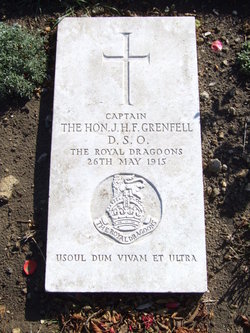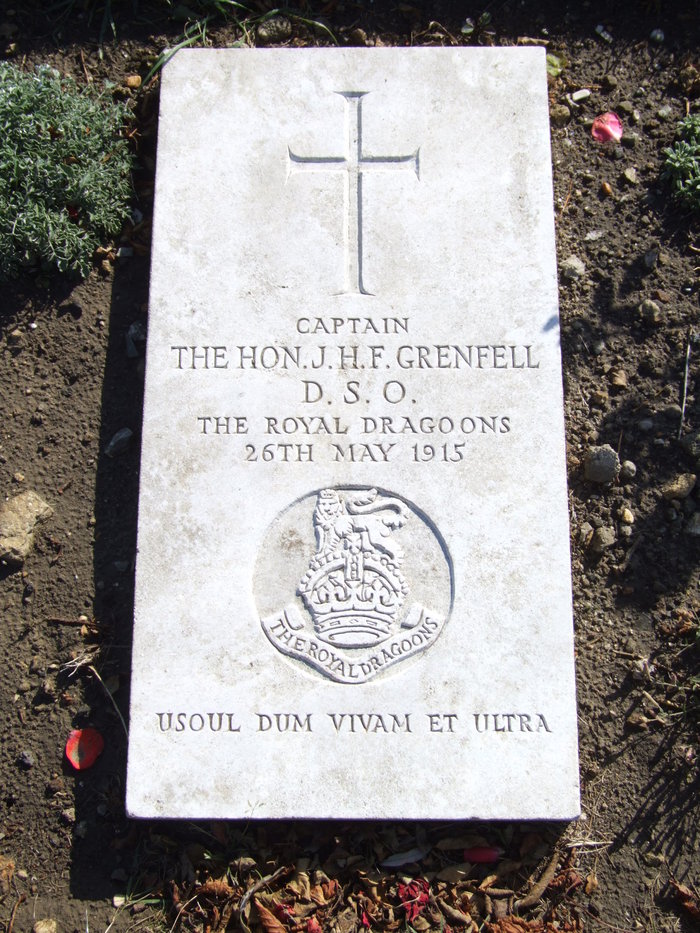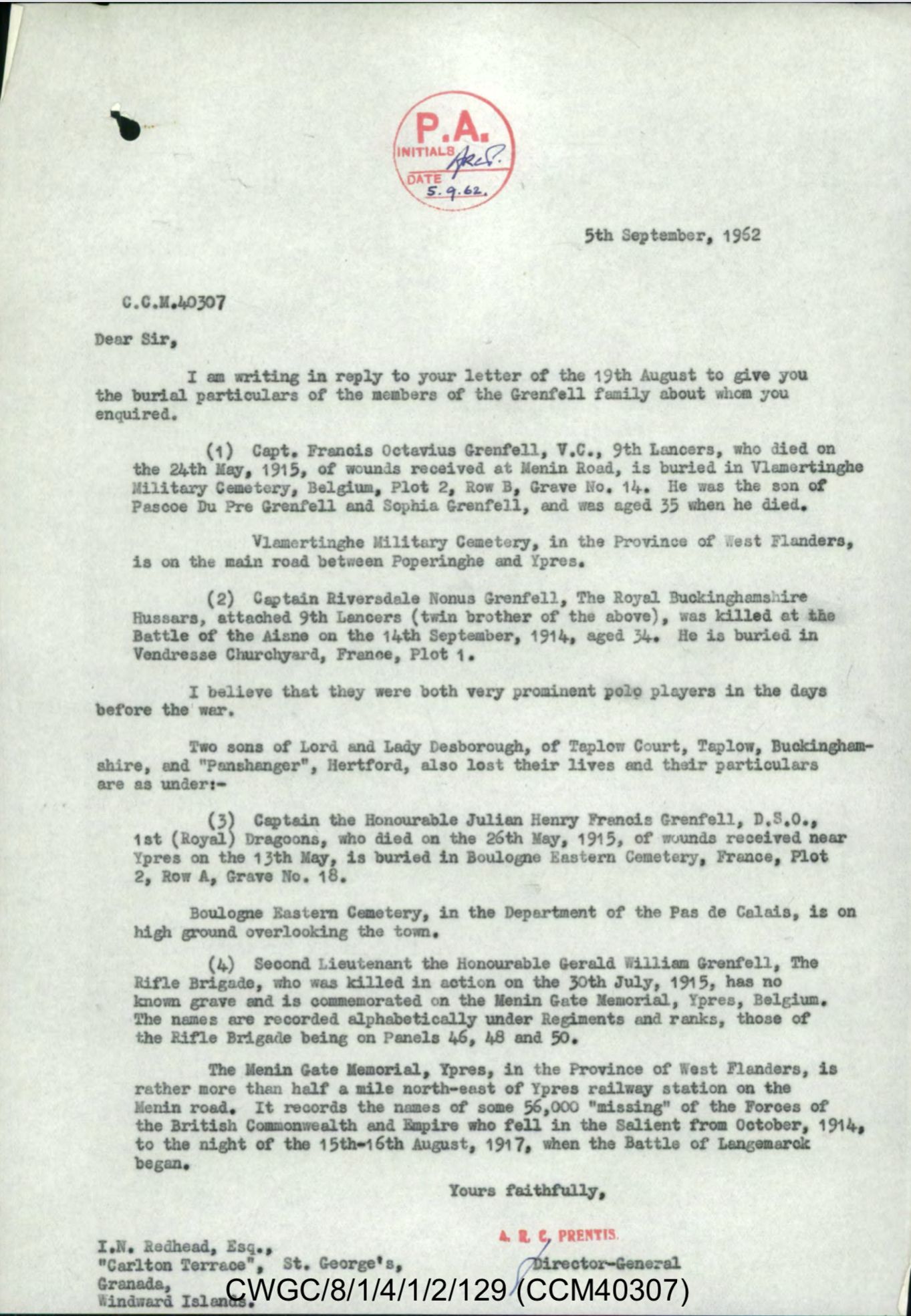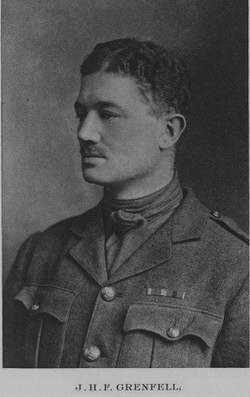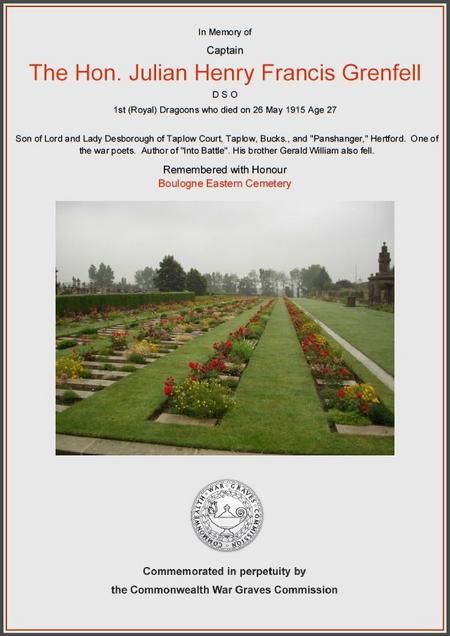BIRTH-1888 June Quarter birth registration-
Name: GRENFELL, Julian Henry F
District: Westminster (vol & Page: 1a & 501)
--The Honourable Julian Grenfell was the eldest son of the 1st (and last) Baron Desborough. Lord and Lady Desborough had homes at Taplow Court, Taplow, Buckinghamshire and at "Panshanger," in Hertford, Hertfordshire.
He served as Captain in the 1st (Royal) Dragoons. He was 27 and was awarded the DSO (Distinguished Service Order.) He was one of the famous war poets, the author of "Into Battle", the last of 11 verses which reads:
"The thundering line of battle stands,
And in the air Death moans and sings;
But Day shall clasp him with strong hands,
And Night shall fold him in soft wings."
--He is one of these sixteen poets honoured and commemorated at the MEMORIAL TO SOME OF THE FIRST WORLD WAR POETS; the memorial is a slate stone which was unveiled on Remembrance Day , 11 November 1985, in the South Transept ('Poet's Corner') of Westminster Abbey in London, England.
The sixteen poets are:
• Richard ALDINGTON, laid to rest in France
• Laurence BINYON, author of "For The Fallen", laid to rest in Reading, Berkshire
• Edmund BLUNDEN, laid to rest in Long Melford, Suffolk
• Rupert BROOKE, author of "The Soldier", laid to rest in Skyros, Greece
• Wilfrid GIBSON, author of "A Lament"
• Robert GRAVES, author of "I, Claudius" and the only poet of the sixteen still living at the time of the commemoration, laid to rest in Deià, Majorca, Spain
• Julian GRENFELL, laid to rest in the Boulogne Eastern Cemetery in Pas de Calais, France
• Ivor Bertie GURNEY, laid to rest in Twigworth, Gloucestershire
• David JONES, laid to rest in Crofton Park, Lewisham
• Robert NICHOLS, laid to rest in St. Mary Churchyard in Lawford, Essex
• Wilfred OWEN, author of "Dulce et Decorum Est" and "Anthem for Doomed Youth", laid to rest in Ors, France
• Herbert READ, laid to rest in Stonegrave, North Yorkshire
• Isaac ROSENBERG, laid to rest in Pas de Calais, France
• Siegfreid SASSOON, laid to rest in Mells, Somerset
• Charles SORLEY, also commemorated at the Loos Memorial
• Edward THOMAS, laid to rest in Agny Military Cemetery, France
--His brother, Second Lieutenant, The Honourable Gerald William Grenfell
another of the war poets, also fell. He was the second son of Baron Desborough and served as Second Lieutenant in the 8th Battalion, The Rifle Brigade. He was 25 and died July 30th 1915.He has no known grave and is therefore commemorated on the Ypres (Menin Gate) Memorial, Panel 46 - 48 and 50.
**It was in English poetry, such as that of Wilfred Owen, that the war poem became an established genre marker and attracted growing popular interest. At the time the term soldier poet was used, but this dropped out of favour. The evolution of the concept was linked to a distinction drawn between poets who were anti-war in attitude and those who wrote more traditional war poetry. A number of them died on active service, most famously Rupert Brooke, Isaac Rosenberg, Wilfred Owen, and Charles Sorley. Others including Ivor Gurney and Siegfried Sassoon survived, but many were scarred by their experiences which were reflected in their poetry. Canadians contributed notable work. The Canadian, John McCrae wrote "In Flanders Fields" which appears on the Canadian $10 bill.
By the Second World War the role of 'war poet' was so well-established in the public mind that 'Where are the war poets?' became a topic of discussion. (biography by Geoffrey Gillon-2011)
[The following kindly submitted by Contributor: A Fifer in Exile (49902043).....]
Extract from The Roll of Honour, A Biographical record of all members of His Majesty's Naval and Military Forces who have fallen in the War, by the Marquis de Ruvigny, Volume I., The Standard Art Book Company, Ltd, December, 1916:
---GRENFELL, HON. JULIAN HENRY FRANCIS, Captain, 1st (Royal) Dragoons, D.S.O., eldest s. and h. of William Henry, 1st Baron Desborough, K.C.V.O., by his wife, Ethel Anne Priscilla, Lady of the Bedchamber to H.M. the Queen, daughter of the Hon. Julian Henry Charles Fane, and granddaughter of John, 11th Earl of Westmorland; born 4, St. James's Square, London, 30 March, 1888; educated Eton and Balliol College, Oxford; gazetted 2nd Lieutenant 1st Dragoons, 15 Sept. 1909 (24 Aug. 1910); and promoted Lieutenant 6 Oct. 1911; temporary Captain 15 Nov. 1914, and Captain 31 Jan. 1915; served with the Expeditionary Force in France and Flanders from 7 Oct. 1914; was mentioned in F.M. Sir John French's Despatch of 20 Nov. 1914-14 Jan. 1915 [London Gazette, 17 Feb. 1915] for gallant conduct in the field; was severely wounded in the head by shrapnel, 13 May, while reconnoitring near Ypres, and died in hospital at Boulogne, 26 May, 1915; unmarried. He had made a special study of reconnaissance work, and was awarded the D.S.O. [London Gazette, 1 Jan. 1915] for having on 17 Nov. "succeeded in reaching a point behind the enemy's trenches, and making an excellent reconnaissance, furnishing early information of a pending attack of the enemy." A poem, "Into Battle," written by him in the trenches appeared in "The Times," and of it Sir W. Raleigh, Professor of English literature at Oxford, wrote: "I don't know if you really know that Julian's poem is one of the swell things in English literature. It is safe for ever, I know it by heart, and I never learned it. It has that queer property which only the best poems have, that a good many of the lines have more meaning than there is any need for, so that new things keep on turning up in it." At Eton he ran well in the steeplechase in 1905, and at Oxford rowed in the college crew. In 1907 and 1908 he was three in the Balliol eight in the Ladies Challenge Plate, and in the following year he was bow in the Balliol four which won the Wyfolds at Henley, and rowed for the O.U.B.C. coxswainless fours. He was a member of the Belsize Boxing Club and proved himself a formidable opponent. His chief sport was shooting. His next brother, Lieutenant G. W. Grenfell, and his cousins, Captain F. Grenfell, V.C., and Captain R. N. Grenfell, were also killed in action (see their notices).
BIRTH-1888 June Quarter birth registration-
Name: GRENFELL, Julian Henry F
District: Westminster (vol & Page: 1a & 501)
--The Honourable Julian Grenfell was the eldest son of the 1st (and last) Baron Desborough. Lord and Lady Desborough had homes at Taplow Court, Taplow, Buckinghamshire and at "Panshanger," in Hertford, Hertfordshire.
He served as Captain in the 1st (Royal) Dragoons. He was 27 and was awarded the DSO (Distinguished Service Order.) He was one of the famous war poets, the author of "Into Battle", the last of 11 verses which reads:
"The thundering line of battle stands,
And in the air Death moans and sings;
But Day shall clasp him with strong hands,
And Night shall fold him in soft wings."
--He is one of these sixteen poets honoured and commemorated at the MEMORIAL TO SOME OF THE FIRST WORLD WAR POETS; the memorial is a slate stone which was unveiled on Remembrance Day , 11 November 1985, in the South Transept ('Poet's Corner') of Westminster Abbey in London, England.
The sixteen poets are:
• Richard ALDINGTON, laid to rest in France
• Laurence BINYON, author of "For The Fallen", laid to rest in Reading, Berkshire
• Edmund BLUNDEN, laid to rest in Long Melford, Suffolk
• Rupert BROOKE, author of "The Soldier", laid to rest in Skyros, Greece
• Wilfrid GIBSON, author of "A Lament"
• Robert GRAVES, author of "I, Claudius" and the only poet of the sixteen still living at the time of the commemoration, laid to rest in Deià, Majorca, Spain
• Julian GRENFELL, laid to rest in the Boulogne Eastern Cemetery in Pas de Calais, France
• Ivor Bertie GURNEY, laid to rest in Twigworth, Gloucestershire
• David JONES, laid to rest in Crofton Park, Lewisham
• Robert NICHOLS, laid to rest in St. Mary Churchyard in Lawford, Essex
• Wilfred OWEN, author of "Dulce et Decorum Est" and "Anthem for Doomed Youth", laid to rest in Ors, France
• Herbert READ, laid to rest in Stonegrave, North Yorkshire
• Isaac ROSENBERG, laid to rest in Pas de Calais, France
• Siegfreid SASSOON, laid to rest in Mells, Somerset
• Charles SORLEY, also commemorated at the Loos Memorial
• Edward THOMAS, laid to rest in Agny Military Cemetery, France
--His brother, Second Lieutenant, The Honourable Gerald William Grenfell
another of the war poets, also fell. He was the second son of Baron Desborough and served as Second Lieutenant in the 8th Battalion, The Rifle Brigade. He was 25 and died July 30th 1915.He has no known grave and is therefore commemorated on the Ypres (Menin Gate) Memorial, Panel 46 - 48 and 50.
**It was in English poetry, such as that of Wilfred Owen, that the war poem became an established genre marker and attracted growing popular interest. At the time the term soldier poet was used, but this dropped out of favour. The evolution of the concept was linked to a distinction drawn between poets who were anti-war in attitude and those who wrote more traditional war poetry. A number of them died on active service, most famously Rupert Brooke, Isaac Rosenberg, Wilfred Owen, and Charles Sorley. Others including Ivor Gurney and Siegfried Sassoon survived, but many were scarred by their experiences which were reflected in their poetry. Canadians contributed notable work. The Canadian, John McCrae wrote "In Flanders Fields" which appears on the Canadian $10 bill.
By the Second World War the role of 'war poet' was so well-established in the public mind that 'Where are the war poets?' became a topic of discussion. (biography by Geoffrey Gillon-2011)
[The following kindly submitted by Contributor: A Fifer in Exile (49902043).....]
Extract from The Roll of Honour, A Biographical record of all members of His Majesty's Naval and Military Forces who have fallen in the War, by the Marquis de Ruvigny, Volume I., The Standard Art Book Company, Ltd, December, 1916:
---GRENFELL, HON. JULIAN HENRY FRANCIS, Captain, 1st (Royal) Dragoons, D.S.O., eldest s. and h. of William Henry, 1st Baron Desborough, K.C.V.O., by his wife, Ethel Anne Priscilla, Lady of the Bedchamber to H.M. the Queen, daughter of the Hon. Julian Henry Charles Fane, and granddaughter of John, 11th Earl of Westmorland; born 4, St. James's Square, London, 30 March, 1888; educated Eton and Balliol College, Oxford; gazetted 2nd Lieutenant 1st Dragoons, 15 Sept. 1909 (24 Aug. 1910); and promoted Lieutenant 6 Oct. 1911; temporary Captain 15 Nov. 1914, and Captain 31 Jan. 1915; served with the Expeditionary Force in France and Flanders from 7 Oct. 1914; was mentioned in F.M. Sir John French's Despatch of 20 Nov. 1914-14 Jan. 1915 [London Gazette, 17 Feb. 1915] for gallant conduct in the field; was severely wounded in the head by shrapnel, 13 May, while reconnoitring near Ypres, and died in hospital at Boulogne, 26 May, 1915; unmarried. He had made a special study of reconnaissance work, and was awarded the D.S.O. [London Gazette, 1 Jan. 1915] for having on 17 Nov. "succeeded in reaching a point behind the enemy's trenches, and making an excellent reconnaissance, furnishing early information of a pending attack of the enemy." A poem, "Into Battle," written by him in the trenches appeared in "The Times," and of it Sir W. Raleigh, Professor of English literature at Oxford, wrote: "I don't know if you really know that Julian's poem is one of the swell things in English literature. It is safe for ever, I know it by heart, and I never learned it. It has that queer property which only the best poems have, that a good many of the lines have more meaning than there is any need for, so that new things keep on turning up in it." At Eton he ran well in the steeplechase in 1905, and at Oxford rowed in the college crew. In 1907 and 1908 he was three in the Balliol eight in the Ladies Challenge Plate, and in the following year he was bow in the Balliol four which won the Wyfolds at Henley, and rowed for the O.U.B.C. coxswainless fours. He was a member of the Belsize Boxing Club and proved himself a formidable opponent. His chief sport was shooting. His next brother, Lieutenant G. W. Grenfell, and his cousins, Captain F. Grenfell, V.C., and Captain R. N. Grenfell, were also killed in action (see their notices).
Inscription
USQUE DUM VIVAM ET ULTRA
